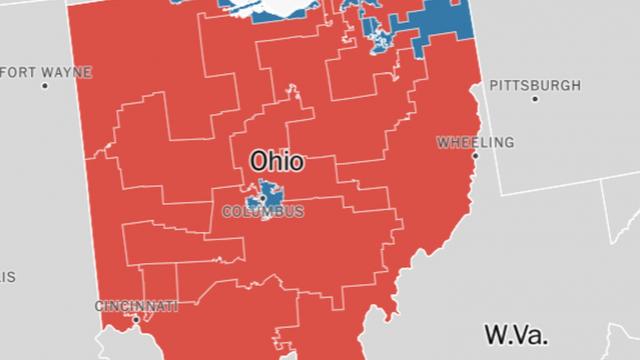
Here's some news you may have missed in the drama of Tuesday's multistate primaries: Ohio voters decided to limit one party’s power to draw congressional lines that would lock the other out of power for a decade.
Advocates say their success in Ohio on Tuesday could be the start of a record-breaking year for redistricting reform, which could be on the ballot in five more states. And that raises the question: Are voters who are sick of Washington now turning their frustration to gerrymandering?
In Ohio, it certainly seems that way. By a 75-to-25 percent vote, Ohio voters approved a constitutional amendment designed to force state lawmakers to come up with a compromise congressional map in 2020 that doesn't just benefit the party in control, which is now the GOP.
Remarkably, Ohio's outgoing Republican governor and most of its Republican lawmakers are on board with this idea, which still lets the legislature redraw electoral maps every decade after a new census rather than hand it over to an independent commission. The GOP-controlled legislature actually voted to send the measure to the ballot.
It's still possible under this new constitutional amendment for lawmakers to redraw districts to benefit their party, but they'd have to go through a maze of lawsuits first.
Ohio may have been primed for this change. In 2015, voters approved similar reforms for the way state legislative districts are drawn.
The next tests of redistricting reform are measures expected to be on the ballot this November in Michigan, Missouri, Colorado and Utah.
“There's never been robust reforms ever introduced like what we're seeing,” said Josh Silver, director of Represent.Us, a nonpartisan anti-corruption group that was one of the groups helping support the Ohio ballot initiative. The Democratic redistricting commission, headed by former attorney general Eric H. Holder Jr., spent $50,000 on the ballot initiative, too.
The ballot initiatives are coming at a time that courts are making moves to limit partisan gerrymandering.
Judges have long struck down lines found to group one race of voters into a district. But in the past year or so, state and federal courts have also started to rule that lines specifically drawn to benefit one party over another are also unconstitutional. The Supreme Court could soon weigh in on landmark cases about the political intent behind Wisconsin and Maryland electoral districts, which could have far-reaching effects on how politicians of both parties draw their electoral lines.
Political scientists caution that gerrymandering is just one of several factors leading to hyperpolarization among lawmakers. Self-segregation by political affiliation (liberals in cities, conservatives in rural areas) is another big one. So is lower voter turnout in primaries, which rewards politicians who cater to their hardcore base.
But gerrymandering has undeniably played a role in keeping Democrats out of control of the House of Representatives for the past eight years. Republicans swept a number of state legislatures in 2010 and thus got to draw four times as many congressional districts as Democrats with new population data from the 2010 census. Democrats have been locked out of Congress ever since.
In Ohio, Republicans control 75 percent of the congressional districts and have a 2-to-1 majority in the state House despite its status as a state.
To take back the majority in the House this November, political scientists calculate Democrats will have to win the popular vote by an extra 7 to 11 percent to overcome lines drawn by Republicans to keep them out. It's not an exaggeration to say that if Democrats can't win back a seat at the table for drawing maps by the time the 2020 Census comes out, they could be locked out of power for a generation.
Both parties have proved they will gerrymander when given the chance. But right now Republicans are the ones in power in a majority of legislatures, and thus the ones with the most to lose with gerrymandering reform. That's why it's notable that many of these upcoming reform battles are taking place in purple or even Republican-leaning states, like Colorado or Missouri.
In those states, Democratic-leaning voters may feel more acutely aware of being locked out of and sliced into different districts. But there's another, more bipartisan explanation for the sudden attention to gerrymandering reform: People are sick of the way government works and see fixing gerrymandering as the answer.
Silver points out that an April Pew Research Center survey found that 61 percent of Americans say “significant changes” are needed in the “design and structure” of American government.
Compare that to a 2006 Pew poll that found 89 percent of Americans had heard “nothing at all” about the gerrymandering debate and didn't seem to care much about it.
“The public is exasperated and finally realizing that no one politician is going to be the great savior,” Silver predicted.
Stay tuned on whether redistricting advocates can repeat Ohio's success across the nation this November. If they do, it would signal a potentially historic turning point for America's relationship with the Way Things Are Done in politics.
Originally published on the Washington Post















